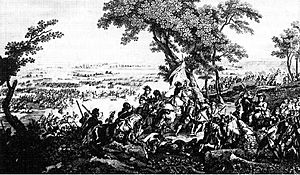Battle of Friedlingen facts for kids
Quick facts for kids Battle of Friedlingen |
|||||||
|---|---|---|---|---|---|---|---|
| Part of the War of the Spanish Succession | |||||||
 The Battle of Friedlingen, unknown author |
|||||||
|
|||||||
| Belligerents | |||||||
| Commanders and leaders | |||||||
| Claude Louis Hector de Villars | Louis William, Margrave of Baden-Baden | ||||||
| Strength | |||||||
| 17,000 men, 35 cannons | 14,000 men | ||||||
| Casualties and losses | |||||||
| 1,600 2,700 |
4,000 2,900 |
||||||
The Battle of Friedlingen was a big fight that happened in 1702. It was part of a larger war called the War of the Spanish Succession. In this battle, the country of France fought against the Holy Roman Empire.
The French army was led by a general named Claude Louis Hector de Villars. The soldiers from the Holy Roman Empire were led by Louis William, Margrave of Baden-Baden. The French army won this battle.
Setting the Stage for Battle
France wanted to gain more control over the land east of the Rhine river. This river was an important border.
In the fall of 1702, the French King Louis XIV told his general, Villars, to attack a region called Swabia.
The French army needed to meet up with their friends, the Bavarians. But the army of the Holy Roman Empire was in their way.
The Battle Begins
On October 14, 1702, the French army crossed the Rhine river. They crossed near a town called Weil am Rhein, which is just north of Basle.
General Villars then attacked the Imperial army at Friedlingen. The Imperial army's leader, Louis William, had prepared his soldiers well.
His army dug in and fought hard. They managed to stop the French for some time. But eventually, Louis William decided to pull his army back. He retreated in an organized way to the north.
What Happened After
Even though the French won, it was a very costly victory for General Villars. This kind of win is sometimes called a Pyrrhic victory. It means you win, but you lose so much that it almost feels like a defeat.
Many soldiers were lost on both sides. French sources say between 1,600 and 2,700 French soldiers were killed or hurt. The Imperial forces lost even more, with about 3,000 to 4,000 men killed or wounded.
Also, General Villars was not able to meet up with his Bavarian allies. This was a key goal for the French.
The small towns and villages on the east side of the Rhine river were badly damaged. Weil am Rhein suffered a lot from the fighting.
 | Janet Taylor Pickett |
 | Synthia Saint James |
 | Howardena Pindell |
 | Faith Ringgold |

